According to the NIDDK, 33% of Americans are overweight (BMI over 25), 36% are obese (BMI over 30) and 6% are extremely obese (BMI over 40).
Being overweight or obese is a risk factor for heart disease, stroke, diabetes, osteoarthritis and some cancers, and your risk increases with higher BMI (body mass index). If you’re overweight, shedding the excess body fat and keeping it off is one of the best ways to improve your health and longevity.
5 Sneaky Causes of Weight Gain
We’ve all heard the message that excess body fat is the result of eating too many calories and not getting enough exercise. If only it were that simple. Weight gain can also be due to factors in our diet and environment that we aren’t even aware of.
1. Environmental Chemicals
Many environmental chemicals have resulted in weight gain when tested on animals in low, non-toxic doses. Examples include heavy metals, solvents, coolants, pesticides and plastics (such as BPA, used in food and beverage containers).
Some of these chemicals known as endocrine disruptors can interfere with weight-controlling hormones. There is even evidence to suggest that exposure to environmental chemicals in the womb may be associated with obesity later in life.
2. Emulsifiers
Emulsifiers are chemicals which cause oil to mix with water. They are used in a wide range of processed foods including ice cream, mayonnaise, margarine, chocolate, bakery products and sausages.
A mouse study published in Nature found that emulsifiers alter gut bacteria, causing inflammation. Mice fed water containing emulsifiers became obese and developed metabolic syndrome, a group of risk factors that increase the risk of heart disease.
3. MSG
Although the flavor enhancer MSG (monosodium glutamate) is associated with Chinese restaurants, it is used by major fast-food chains and is also found in a variety of processed foods.
A study of 750 Chinese men and women found that those who used the most MSG in their cooking were nearly three times more likely to be overweight than those who didn’t use any. The increase in obesity risk was independent of physical activity and total calories consumed.
4. Artificial Sweeteners
Many people use sugar substitutes as a weight-loss aid, but these sweeteners may actually contribute to weight gain.
In a study published in Nature, scientists found that mice fed saccharin, sucralose or aspartame developed glucose intolerance, a metabolic condition associated with obesity and type 2 diabetes. The artificial sweeteners altered the animals’ gut microbiomes towards a balance of bacteria associated with metabolic diseases.
In a follow-up study on 7 human volunteers, 4 became glucose intolerant after consuming the maximum recommended dose of saccharin for one week.
5. Low-Fat Foods
Gram for gram, fat has more than twice as many calories as protein or carbohydrates, so people tend to assume that foods labeled ‘low fat’ are good for weight loss.
In a study published in the journal Appetite, researchers analyzed nutrition information for nearly 6000 foods and found that, overall, products with low-fat claims were not significantly lower in calories than their full-fat equivalents.
Low-fat foods may even lead people to consume extra calories. A study investigating the effects of different fats on satiety found that participants were less hungry two hours after eating regular muffins compared to fat-free muffins.
If you want to lose weight, it can help to avoid processed food, fast food and intensively farmed food. The production methods, containers and the ingredients could all increase your risk for obesity.
Remedies to Help You Lose Weight Naturally
Here are some science-backed methods to help you lose that stubborn weight naturally.
1. Drink Plenty of Water

Drinking water boosts your metabolism due to a process known as water-induced thermogenesis. When you drink a glass of cold, or even room-temperature water, your system has to burn calories to heat it up to your body temperature (37 C).
In one study, scientists assessed the effect of drinking water by measuring subjects’ oxygen uptake and carbon dioxide production in a respiratory chamber. They found that 500 ml of water increased metabolic rate by 30% in both men and women. The effect was sustained for over an hour. The researchers estimate that increasing water consumption by 1.5 liters daily would result in a loss of 17,400 calories or 5.3 lbs. of body fat over the course of a year.
Drinking a glass of water before every meal can be doubly beneficial because it fills you up so you’re not tempted to overeat.
In a trial published in the European Journal of Nutrition, 14 healthy young men were provided with breakfast and told they could eat as much as they wanted. Half of the men were instructed to drink a pint (568 ml) of water before the meal. The water group consumed significantly fewer calories. Questionnaires filled out by the participants showed that, compared to the control group, the water group experienced increased satisfaction and fullness and decreased hunger.
In a study published in the journal Obesity, 48 overweight adults aged 55-75 were given instructions for a low-calorie diet including meal plans and sample menus. Half of the participants were also given cases of bottled water and told to drink one 16-ounce bottle before each meal. Over the following 12 weeks, the water group showed a 44% greater weight loss than the non-water group.
Recommended:
2. Eat More Fiber
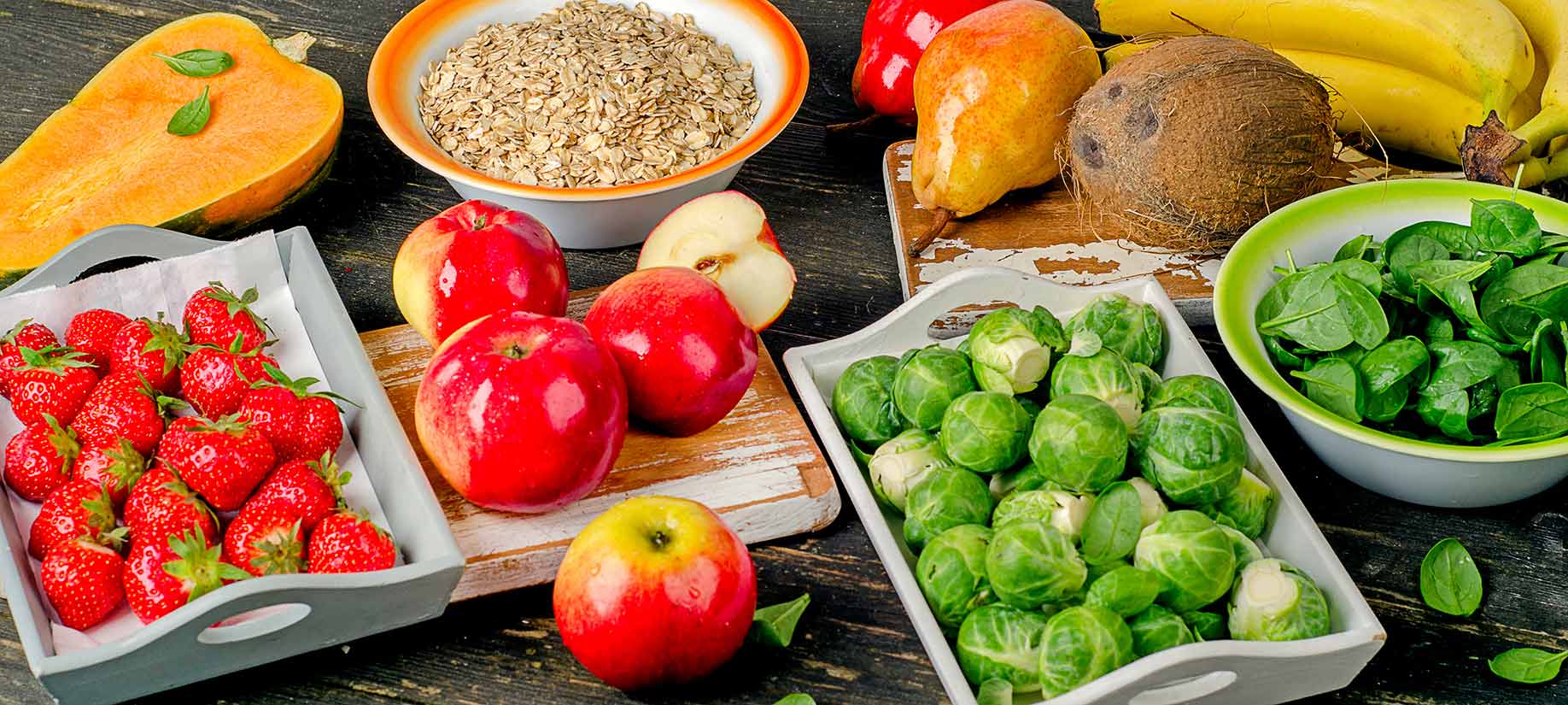
Fiber is plant material that resists digestion by humans. Insoluble fiber (also known as roughage) passes through your gut without being broken down. It adds bulk to food without adding any calories.
Soluble fiber travels to the large intestine where bacteria convert it into fatty acids which are used as an energy source. It dissolves in liquid and many types form a viscous gel in the gut which slows the emptying of the stomach, leading to prolonged feelings of fullness.
A review article summarizes the results of studies into the effects of fiber on energy intake and body composition. In studies of people on a calorie-controlled diet, fiber increases feelings of fullness following a meal and decreases subsequent hunger. In studies where participants could eat as much as they liked, eating an additional 14 grams of fiber per day resulted in an average 10% decrease in calories consumed and an average weight loss of four pounds over 3.8 months. Fiber has a greater effect on body weight for obese subjects compared with those of normal weight.
In a trial published in the journal Nutrients, 118 overweight adults were given either a supplement containing a combination of viscous soluble fibers or a control supplement made from rice flour. All participants were equipped with a mobile food recording app which provided the researchers with before-and-after images of all food consumed along with the time and place it was eaten. Measurement of participants’ height, weight and waist circumference were taken before and after the trial.
After 12-weeks of supplementation, the fiber granule group had a significant reduction in waist circumference, weight and BMI compared to the control group. Analysis of the mobile app data showed that they ate less often than before supplementation and reduced their intake of grain-based food.
Good sources of soluble fiber include
- oats, barley and rye
- pectin fruits such as apples, plums and oranges
- root vegetables like carrots and potatoes
- legumes including soybeans, kidney beans and lentils
Method: You can get more fiber in your diet simply by leaving the skin on vegetables such as potatoes, carrots and cucumber and fruits like apples and pears. While few people would want to eat an unpeeled piece of citrus fruit, you can zest the rind and use it in cooking. Don’t remove the fibrous membrane surrounding the fruit segments.
Recommended:
3. Cook with Coconut Oil

Most vegetable or seed oils contain long-chain fatty acids which must be broken down in the intestines and transported to the blood to use as energy or storage in fat cells.
Coconut oil is the best source of medium-chain fatty acids which are delivered directly to the liver for use as an instant energy source. Research suggests that medium chain fatty acids can help promote weight loss by suppressing appetite and increasing metabolism.
In one study healthy men were randomly assigned to one of three high-fat diets that differed only in terms of the ratio of long-chain fatty acids to medium-chain fatty acids. They could eat as much as they liked of the foods they were offered. Food intake and total calories consumed were significantly lower on the diet with the highest amount of medium-chain fatty acids. The men in the high medium-chain fatty acid group even lost a little weight, whereas those in the other groups gained weight.
In a randomized controlled trial published in the journal Obesity, 24 overweight men were divided into two groups. One group were put on a weight-maintenance diet containing oils rich in medium-chain fatty acids. The other were given the same diet, but with olive oil (high in long-chain fatty acids). After four weeks on the diet and a four-week washout period the groups switched diets. The men’s body composition was assessed using an MRI scan before and after each four-week trial. Participants lost significantly more body fat on the medium-chain fatty acid diet, especially from the upper body.
A study on overweight women given coconut oil had similar results with a significant reduction in waist circumference.
Method: Coconut oil is very versatile. It can be used in place of vegetable oils for frying or roasting and substituted for butter or margarine in baking. You can even melt it and drizzle it over vegetables or seafood for added flavor.
All types of oil are high in calories, so remember that the idea is to use coconut oil instead of other fats, not in addition to them.
Recommended:
4. Have Soup for Lunch
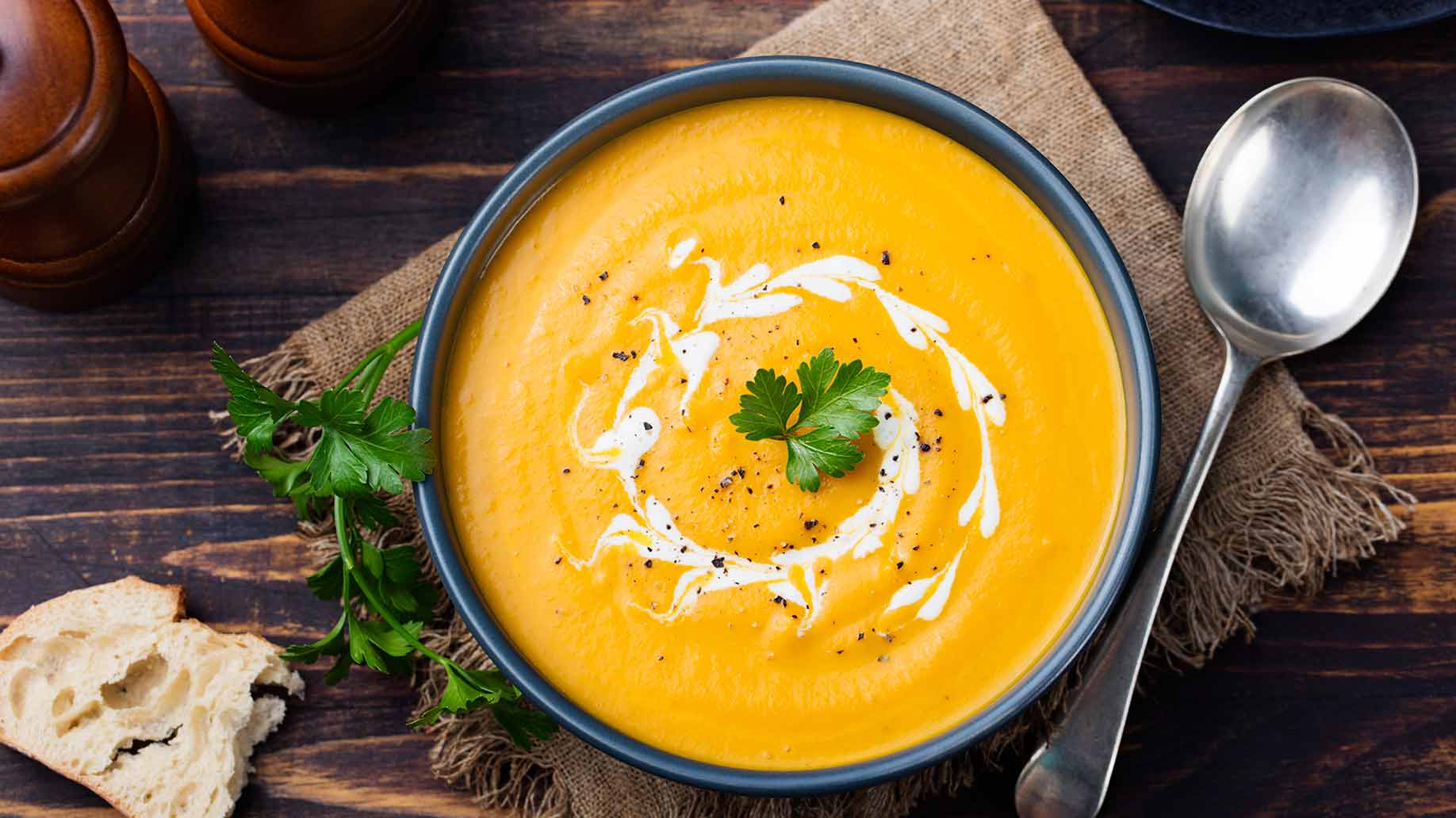
If you take a meal of meat and vegetables, add water and blend it into soup, it will stave off hunger longer than eating the individual food components.
When you eat solid food along with a beverage, the liquid rapidly sieves out of the stomach, reducing its volume. If liquid is thickened with solids, it takes longer to digest, prolonging feelings of fullness.
In a study published in the Journal of Nutrition, one group of volunteers were given a meal of chicken with vegetables along with a glass of water. Another were given the same ingredients served as a blended soup. At intervals over the next 3 hours both groups were asked to rate their sense of fullness on a scale from one-to-ten. The soup group felt significantly less hungry.
In a follow-up study, participants who ate the same meals underwent MRI scans so that researchers could examine the digestive process. The scans confirmed that the volume of stomach contents decreased more slowly after the soup meal than after the solid/liquid meal.
In another study, 24 women ate breakfast, lunch and dinner in a laboratory. Shortly before lunch, they were served either chicken rice casserole, chicken rice casserole with a glass of water or chicken rice soup made from the same ingredients. They could then eat as much as they liked from a lunch buffet. Those who ate the soup consumed significantly fewer calories at lunch than the other two groups and did not compensate by eating more calories at an all-you-can-eat dinner.
Method: For a quick and easy soup, boil two cups of water and add a stock cube. Add fresh or frozen chopped vegetables and simmer until soft or use leftover cooked vegetables. Throw in some chopped cooked chicken or ham. Puree with a stick blender until smooth and season to taste.
Recommended:
5. Drink Green Tea
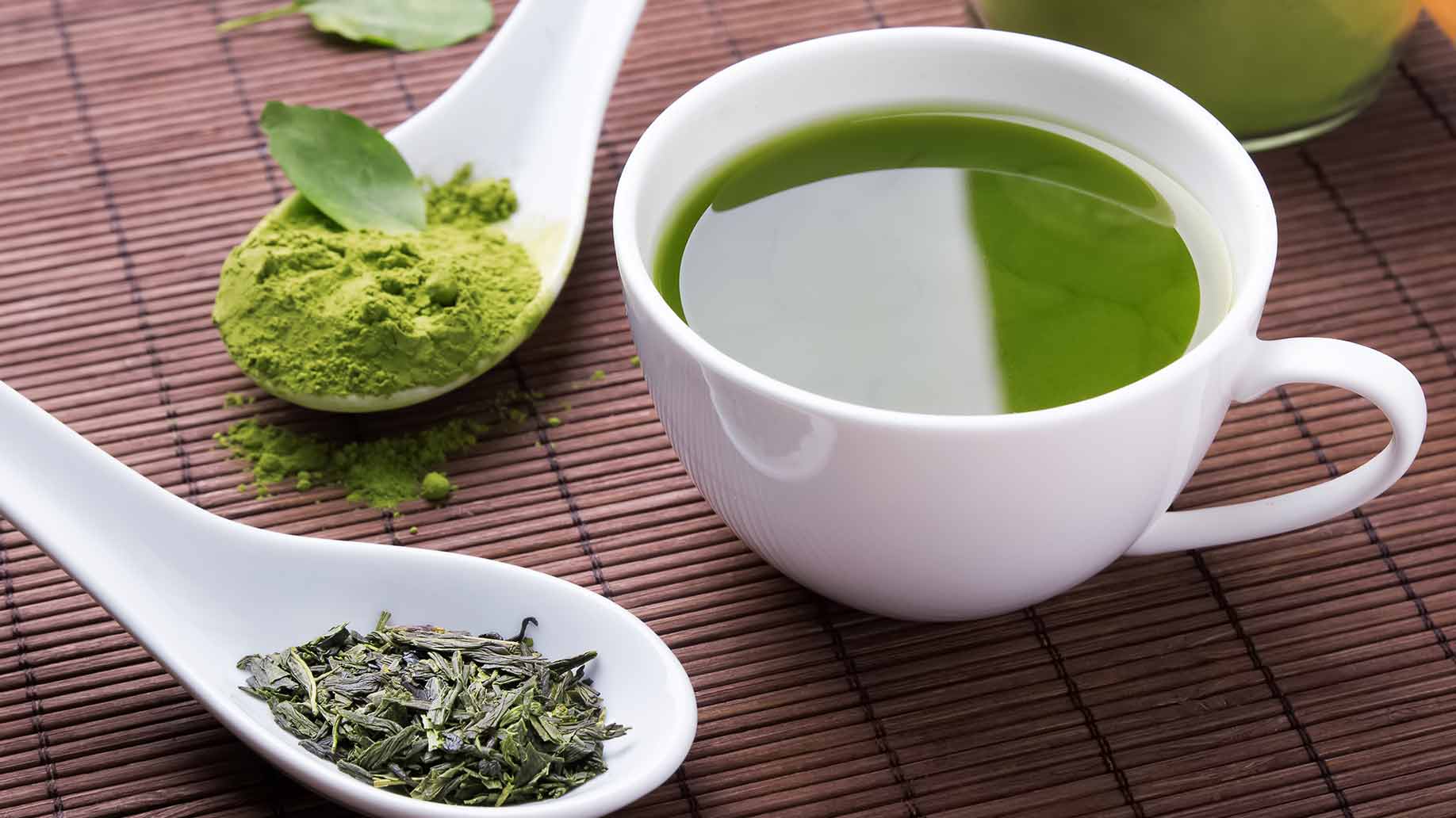
Green tea is an especially rich source of antioxidants called catechins. It also contains caffeine. Both of these substances can increase metabolism, but when consumed together they have a synergistic effect. They help to boost levels of the hormone norepinephrine which signals fat cells to release stored fat into the bloodstream for use as energy.
In one study healthy subjects spent 24 hours in a respiratory chamber designed to measure their energy expenditure. They were given supplements containing either green tea extract, caffeine or a placebo. Those who consumed the green tea extract supplement burned significantly more calories than the control group. They also had significantly higher amounts of norepinephrine in their urine. Caffeine alone (in the same amount present in the green tea extract) did not increase fat burning.
The amount of catechins in a cup of green tea varies depending on the precise type of tea, the ratio of tea to water, and how long it is left to infuse. A large Chinese trial investigated the effects of consuming green tea with different amounts of catechins on body weight and composition. Researchers randomly assigned 182 overweight participants to four groups. Each group was given a different type of green tea ranging from a control drink with the catechins extracted to one with extra catechins added. Subjects drank 2 cups a day for 90 days.
Compared to the control group, the group drinking the extra high-catechin tea showed significant reductions in body weight, waist circumference and intra-abdominal fat. Groups drinking green tea with lower levels of catechins also lost body fat. The researchers concluded that daily consumption of 500–900 mg of green tea catechins can exert a positive effect on abdominal fat mass.
Method: An average cup of green tea contains around 180 mg of catechins, but this can vary depending on a number of factors. To boost the amount of catechins per cup, use a good brand of loose-leaf green tea. Bring the water to a rolling boil before pouring it over the leaves, then leave it to infuse for five minutes before straining.
Recommended:
6. Eat More Protein
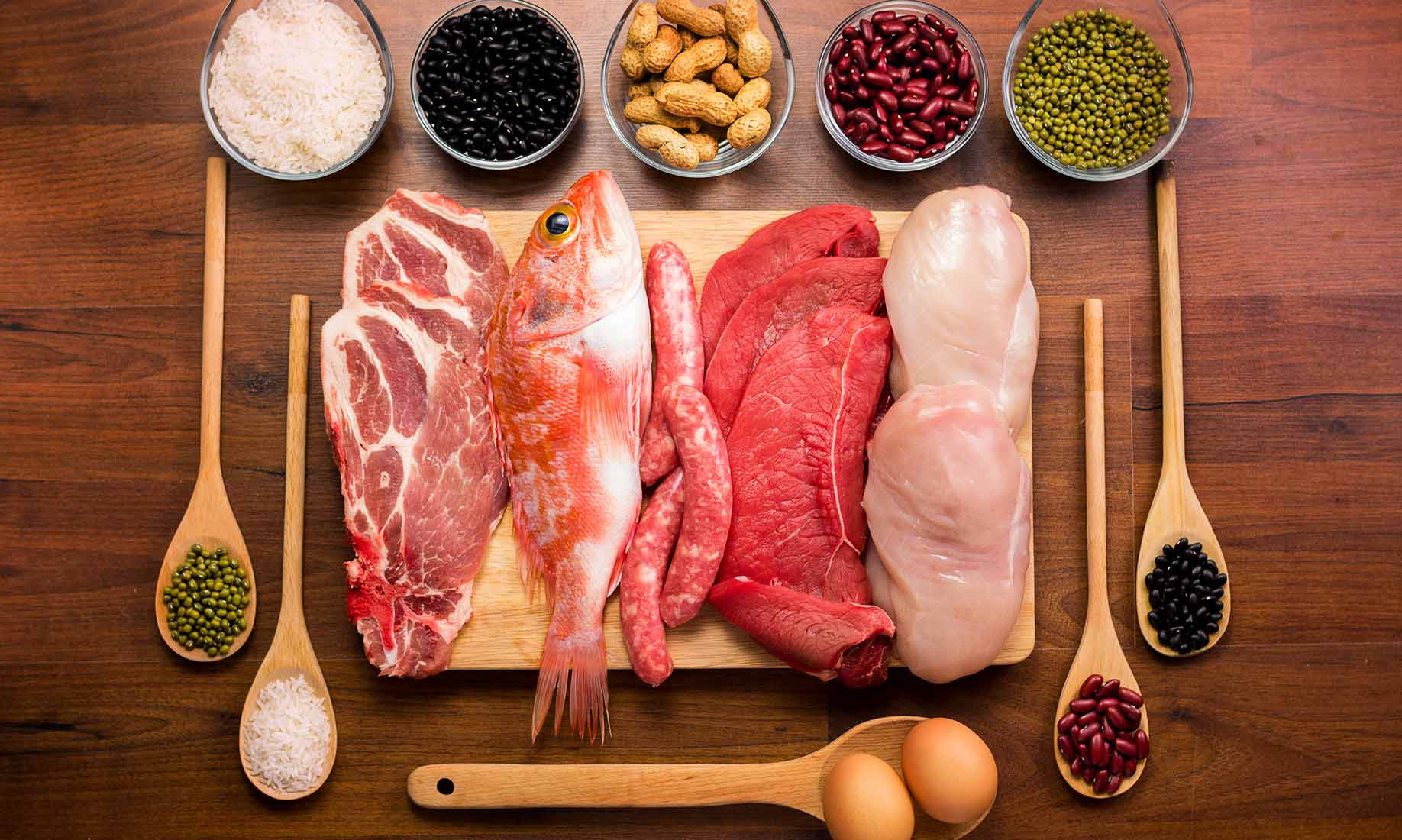
Protein takes longer to digest than fats or carbohydrates and process of digesting protein burns more calories.
In one study participants ate high protein or high carbohydrate meals. Their energy expenditure was measured two and a half hours later. Researchers found that subjects were burning twice as many calories following a protein meal as they did following a carbohydrate meal.
Protein is also more satiating than carbohydrates or fat. A study published in Obesity examined the effects of protein on appetite and satiety during weight loss. Overweight men were put on a 12-week low-calorie diet and randomized into two groups. One group was given a diet consisting of 25% protein and the other were given a diet with 14% protein. The men completed questionnaires every waking hour on selected days. Compared to the lower protein group, the high protein group felt fuller throughout the day, had less desire to eat at night and were less preoccupied with thoughts of food.
Since dietary protein both increases the metabolism and decreases appetite, eating more protein may allow you to lose weight without much effort.
In a study published in the American Journal of Clinical Nutrition 19 subjects were placed on a high protein diet (30% protein, 20% fat, and 50% carbohydrate) for 12 weeks. They were allowed to eat as much of the food provided as they wished, but were instructed to eat when they were hungry and stop eating when they were satisfied. They were also told to avoid making any conscious effort to modify their body weight. The participants spontaneously decreased their food intake by an average of 441 calories a day and lost an average of 10.8 pounds.
Method: Make high-protein foods the star of every meal and replace snacks like potato or corn chips (carbohydrate fried in fat) with protein foods like beef jerky, nuts or peanut butter.
Recommended:
- Protein Powder – Plant Based, Organic, Creamy Chocolate Fudge
- Protein Powder – Plant Based, Organic, Sweet Vanilla Bean
- Whey Protein Powder – Grass Fed, Raw, Organic
7. Start the Day with Eggs
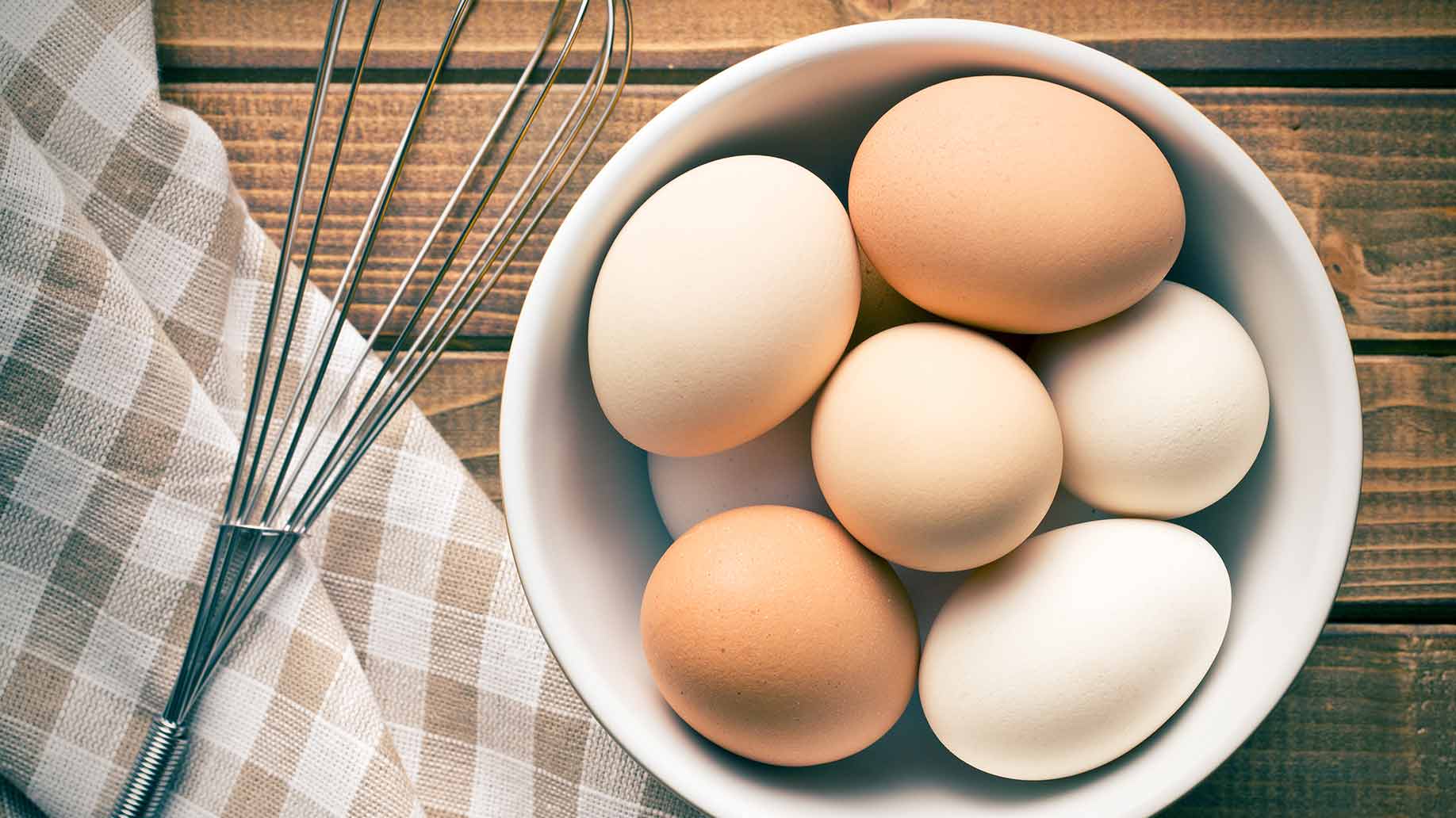
If your usual breakfast consists of cereal or toast, switching to an egg breakfast could help you lose weight.
Many popular breakfast foods, like bagels, waffles and croissants are high in carbohydrates. They cause a sharp rise in blood sugar which triggers the body to produce the hormone insulin. Insulin lowers blood sugar levels, but simultaneously activates fat storage and prevents the body from using fat as energy.
A medium egg contains virtually no carbohydrates, 6.4 grams of high quality protein and 13 essential vitamins and minerals. Two medium eggs boiled or poached contain just 132 calories, making them a nutrition-packed natural breakfast choice for weight loss. In addition, eggs have a 50% greater satiety index compared to breakfast cereal or white bread so they help keep you feeling fuller longer.
In a study published in the Journal of the American College of Nutrition, 30 overweight women consumed either an egg-based or bagel-based breakfast containing the same number of calories. Three and a half hours later they were given lunch. In the meantime, they filled out questionnaires about fullness and food cravings. Those who had the egg breakfast reported significantly greater feelings of satiety and consumed significantly fewer calories both at lunch and over the following 36 hours.
In another study published in the International Journal of Obesity, overweight or obese men and women were assigned to eat a calorie-matched egg or bagel breakfast as part of a low calorie weight-loss diet. After eight weeks, in comparison to participants on the bagel diet, those on the egg diet showed a 65% greater weight loss, a 61% greater reduction in BMI and a 34% greater reduction in waist measurement. Cholesterol levels did not differ between the two groups.
Beginning in the 1970s, people were advised to limit their consumption of eggs due to concerns that dietary cholesterol would raise blood cholesterol levels and increase the risk for coronary artery disease. However, numerous population studies conducted in more recent years do not support this theory. A 2012 meta-analysis of previous research concluded that higher consumption of eggs is not associated with increased risk of heart disease or stroke.
Recommended:
When Diets Don’t Work

Most popular diets do allow people to lose weight in the short term (assuming they don’t cheat). But after ending the diet, people tend to gain the weight back or even put on extra pounds.
A review article looked at the long-term outcomes of low-calorie diets and found that up to two thirds of dieters regain more weight than they lost. The researchers concluded that there is little support for the idea that dieting leads to long-term weight loss or health benefits.
It could be possible that the type of people who go on diets are those with a genetic propensity towards putting on weight, making them more apt to regain it. A large twin study was devised to test this theory. Researchers tracked the weight and height of 4129 twins from the age of 16 to 25 and collected information about the number of times they had intentionally lost weight on a diet. When they compared pairs of genetically identical (monozygotic) twins, one of which who had dieted in the past and one who had never dieted, they found that dieting increased the risk for accelerated weight gain independent of genetic factors.
Any diet that is unsustainable in the long run is doomed to fail. No one can live on cabbage soup or grapefruit for the rest of their lives. Diets that rely on pre-packaged low-calorie meals or meal-replacement shakes take away the dieter’s own responsibly for making healthy choices. The eating habits that caused people to put on weight in the first place are usually resumed shortly after their weight-loss goal has been reached.
To lose weight and keep it off in the long-term, permanent lifestyle changes are a better approach than a temporary diet. Simply concentrate on eating more healthily, exercising and giving up bad habits.
Here are some examples of common-sense changes that can help with weight loss and weight maintenance.
- Avoid processed foods and learn to make simple meals from fresh ingredients.
- If you eat bread products made from white, refined flour, switch to wholegrain.
- Don’t keep junk food in your cupboards or fridge.
- Eliminate liquid calories from sugary drinks.
- Avoid any foods that are battered or breaded and deep fried.
- Choose foods without any added sugar.
- If you’re a chocoholic, switch to a dark chocolate with at least 70% cocoa solids.
- Reserve half the room on your dinner plate for non-starchy vegetables.
- Pay attention to ingredients, calories and nutrition information on labels.
- Listen to your body: eat when you are hungry and stop when you’re full.
- Spend less time sitting in front of screens and more time being physically active.
Final Word
None of the methods listed here will result in the kind of rapid weight-loss associated with very low-calorie fad diets. On the other hand, they don’t involve starving yourself either.
Everyone’s bodies are a little bit different. You can try each method for a few weeks to see which ones best fit in with your routines and food preferences, and which ones make the most difference to your waistline.






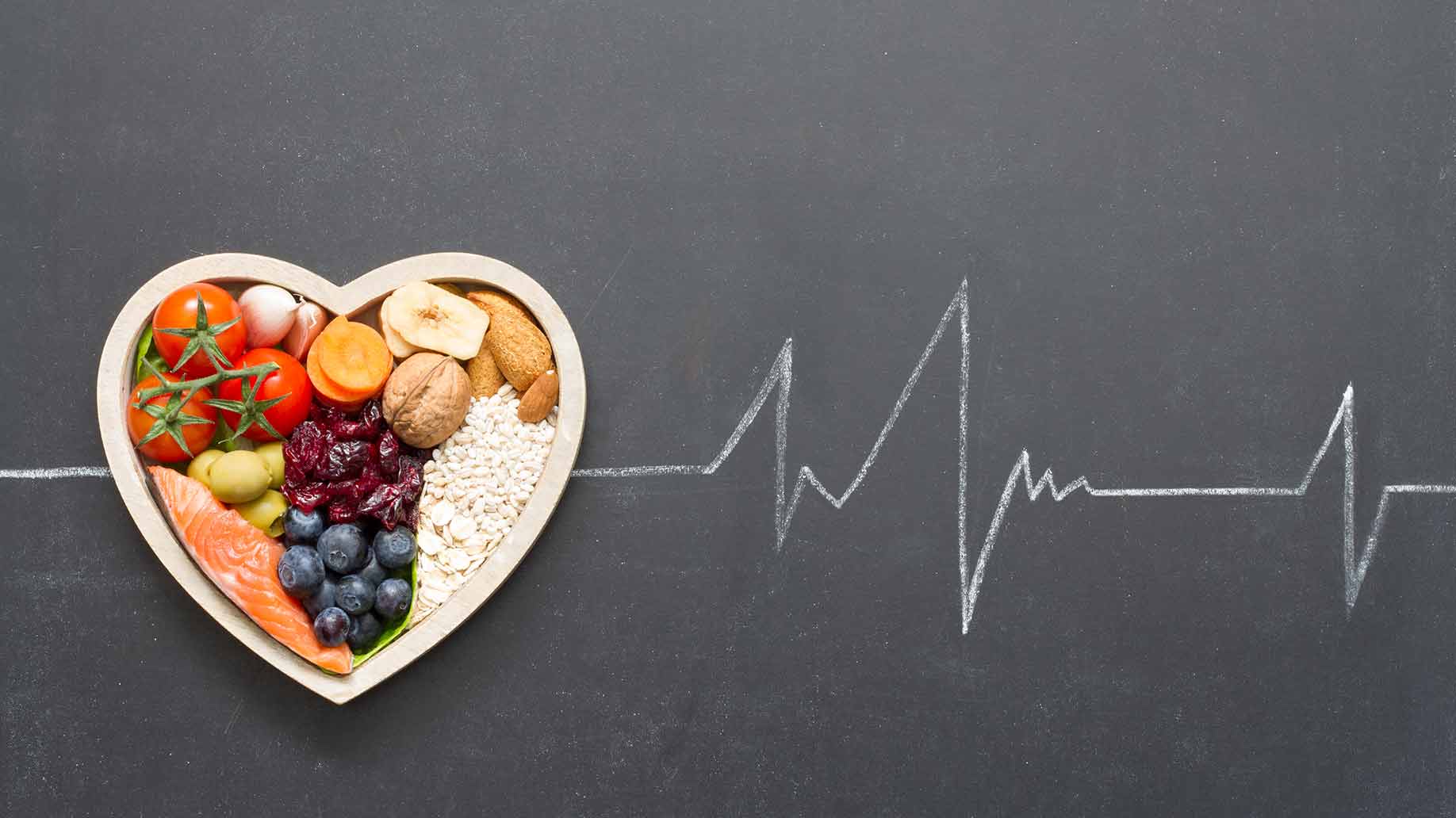


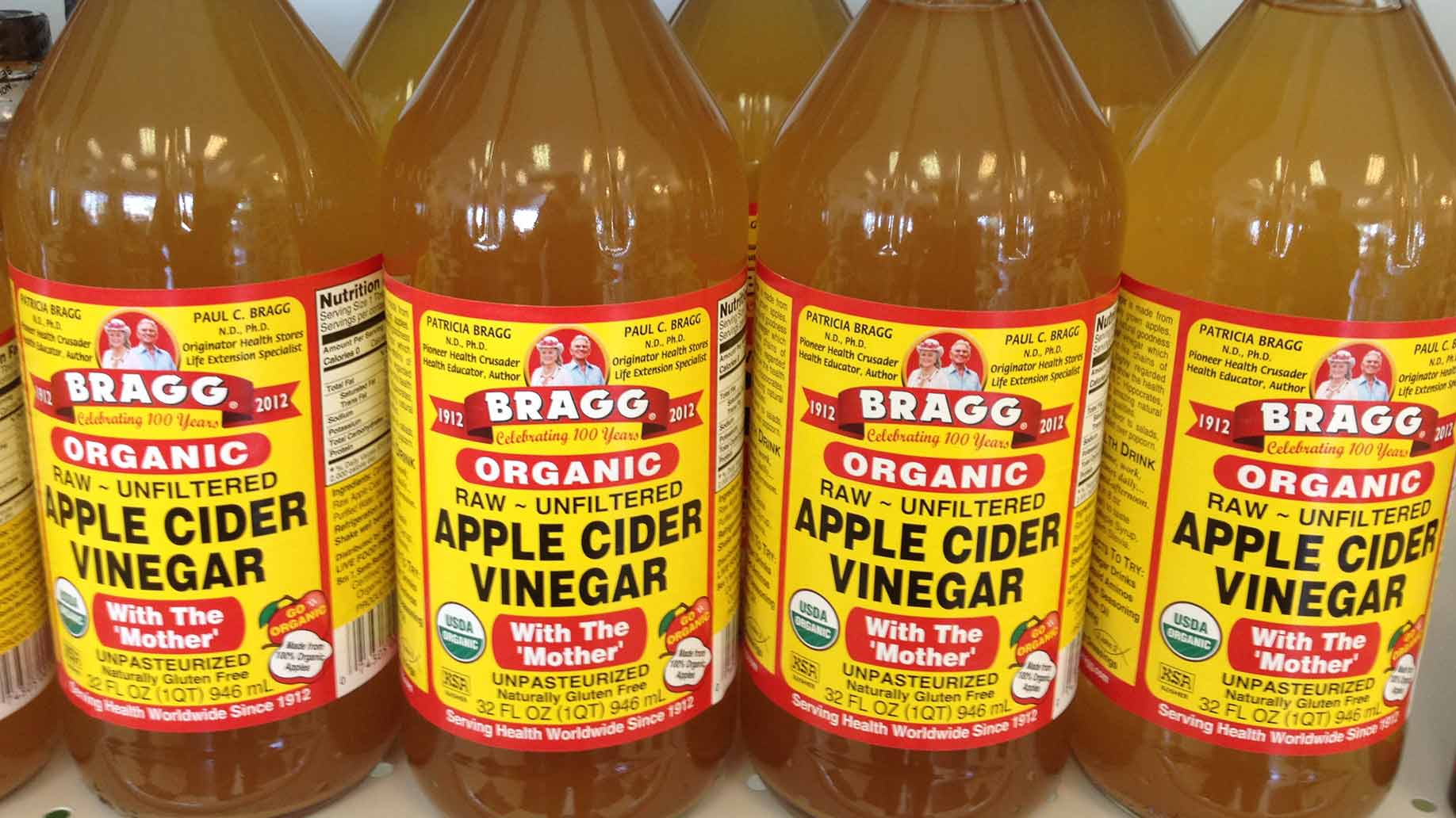
I’m searching the best methods of weight loss from healthy diet and I got your post it is all about what I need. Thanks for sharing.
Great common sense article. Thanks 🙂
I love French fries but they are so unhealthy so I make th myself at home. I just cut potatoes and bake them and add some pink Himalayan salt and they taste amazing and are so much Healthier
Your exercise on your low-carb and fasting days could be anything really easy and enjoyable like walking the dogs or taking a bike ride. It’s really that easy. The whole idea is just to stay active. When you do that in conjunction with a fasting or low-carb day, you allow your body to tap even further into its existing energy and fat stores.
Great info in this article. I’ll start doing more of some of this. Thank You for the info.
Good article. Thanks.